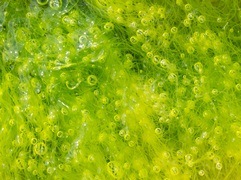RTD Success Stories - Unlocking the biofuel potential of algae
Current research suggests that using algae may be the only viable method to produce enough biofuel to replace current world petroleum and oil usage. Seaborne micro-algae in particular have much faster growth rates than terrestrial crops. The yield of oil from algae is estimated to be between 19 000 to 75 000 litres per acre, per year. This is 7 to 31 times greater than palm oil, the next best crop in this context. With such untapped potential lurking below the surface of the sea, the Mabfuel project is running a multi-disciplinary research programme aimed at developing new knowledge and skills in the production of biofuels from native seaweed and cultured micro-algae. Sites managed by partner organisations in Turkey and Ireland are currently testing the feasibility of using algae – microalgae, which are very small plant-like organisms, and/or macroalgae, such as seaweed or kelp – as a feedstock for producing biofuels. The project – funded by the EU's FP7 programme – is working to identify the native seaweed and cultured micro-algal processes with the most potential for fuel production. Part of the research focuses on the optimum time and technique needed to harvest seaweed and the culture methodologies for micro-algae. This research is providing the physical (biomass product) and the intellectual (methodology for production and extraction) tools to enable the biofuel sector to base its business on the most suitable and profitable processes. The difficulties in efficient biofuel production from algae lie not in the extraction process but in finding a species with high lipid-carbohydrate content and fast growth rate, plus a cost-effective cultivation system for micro-algae that is best suited to that species. Two methods are currently used to produce micro-algae for biofuel: raceway ponds and enclosed, transparent containers known as 'photobioreactors'. Mabfuel researchers are analysing these and other methods as they attempt to hone the process of oil extraction from micro-algal species which can achieve optimal levels of biofuel. "We sampled wild seaweeds in different seasons and locations around Ireland and Turkey over a two-year period," says Mabfuel project coordinator Dr Julie Maguire. "In total, we sampled 14 species in Turkey from the Black and Aegean Seas and 15 species in Ireland along the Atlantic coast." After trials on many micro-algal species, the Mabfuel team selected two species to culture, both in indoor systems and outdoor tanks: Nannochloropsis oculata and N. salina. These species were chosen because they contain the highest oil content. "We found that outdoor cultures had a better oil content than indoor and were also much cheaper to produce," Dr Maguire explains. "We tested many oil-extraction techniques and also used hydrothermal gasification using 'wet biomass' because drying algae, particularly in Ireland, was problematic," she adds. "We are also trying to improve our micro-algal harvesting techniques as this is another area that currently requires a lot of energy." Addressing global demand Today, most research into efficient algal-oil production is being carried out by the private sector. Mabfuel researchers are working on an economic and environmental appraisal which will identify the size of the farm required and the feasibility of a commercial-size operation. The objective is to find a model which would produce algal oil on a level capable of supporting and even replacing the global demand for petrochemicals. The Mabfuel project plans to disseminate its findings to local communities, national and professional bodies, international associations and the broad scientific and technical aquaculture community through all available media sources. "We are currently in the final year of our project so are working out the costs and life-cycle analysis of the whole process of producing biofuel from algae," says Dr Maguire. "We are also conducting a consumer survey of attitudes of using bio-oil." At the end of the project, the Mabfuel team intends to release a final scientific report which will highlight the discovery and application of biofuel products, aquaculture and industrial processes involved, knowledge gaps to be filled and the proposed route to commercialisation. - Project full name: Marine algae as biomass for biofuels - Project acronym: Mabfuel - Mabfuel project website(opens in new window) - Project reference number: 230598 - Name/country of project coordinator: Dr Julie Maguire, The Daithi O’Murchu Marine Research Station, Galway (Ireland) - Total project cost: EUR 1 430 841 - EC contribution: EUR 1 430 841 - Project start/end: June 2009 to May 2013 - Other partner countries: Ireland, United Kingdom, Turkey



